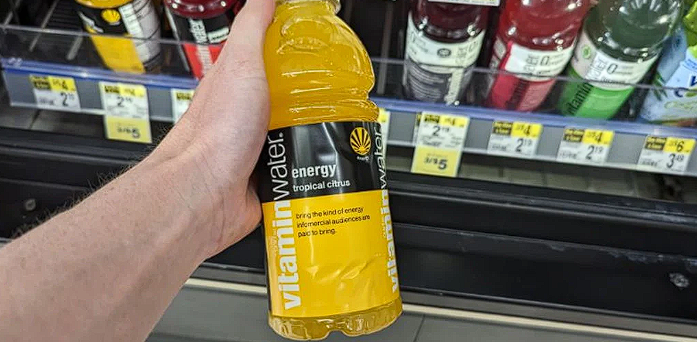Key Takeaways:
- Vitamin Water, despite its marketing as a health drink, is high in sugar, artificial ingredients, and fillers, making it less beneficial than it appears.
- Regular consumption of Vitamin Water can negatively impact weight loss goals and increase the risk of diseases like obesity, type 2 diabetes, and heart disease.
- The vitamins and minerals in Vitamin Water provide minimal benefit, as your body already receives these nutrients from a balanced diet.
- A healthier alternative to Vitamin Water is Tyent alkaline hydrogen water, which offers superior hydration and nutritional benefits without added sugars or artificial ingredients.
In the world of beverages, Vitamin Water stands out as a tempting middle ground between plain water and sugary sodas. Promising hydration with added nutrients and often touting bold claims about boosting energy, immunity, and overall health, it’s easy to see why it’s so popular. But is Vitamin Water good for you? Or is it just another clever marketing trick?
In this article, we’ll break down everything you need to know about Vitamin Water to help you decide if itr deserves a spot in your diet—or if you’re better off sticking with healthier alternatives.
What Is Vitamin Water?
Vitamin Water, owned by Coca-Cola, is a beverage marketed as a healthier alternative to sugary drinks. It’s infused with vitamins like A, C, E, and various B-complex vitamins, as well as minerals such as zinc, magnesium, chromium, and potassium. A quick glance at the label might suggest it’s a beneficial choice, and many people are drawn to it for its promise of added nutrients.
However, there’s more to the story. While the added vitamins and minerals may sound appealing, Vitamin Water is also laden with sugar, artificial ingredients, and fillers, which significantly dilute its health claims. At first look, it might seem like a good option, but its overall composition raises concerns.
Is Vitamin Water Good for You?
No, Vitamin Water is not good for you. Despite its health-focused name and branding, it doesn’t deliver the benefits you might expect. In fact, it could even hinder your health goals if consumed regularly.
While you might turn to products like Vitamin Water as a healthier alternative, the reality is that it’s more of a marketing strategy than a genuinely healthful choice. Packed with sugar, artificial ingredients, and fillers, it offers little to no real health advantages. The vitamins and minerals it contains are overshadowed by its high sugar content, which can negatively impact your well-being.
If you’re looking for a truly healthy hydration option, consider investing in a Tyent water ionizer. Unlike Vitamin Water, Tyent water is rich in antioxidants and has a high pH that helps neutralize acids in the body, providing superior hydration without the added sugars or artificial ingredients. Tyent’s advanced filtration system ensures you’re drinking clean, pure water that supports overall wellness and cellular health, helping you achieve your health goals naturally.
Why You Shouldn’t Drink Vitamin Water
If you’re serious about your health, there are plenty of reasons to steer clear of Vitamin Water—or to quit drinking it if it’s already part of your routine. This is especially crucial if you’re working toward specific weight or fitness goals, as this drink can actively hinder your progress.
Here are key reasons to avoid Vitamin Water.
1. High in Sugar & Other Fillers
Vitamin Water may highlight its added vitamins and minerals, but what ads don’t tell you is that these nutrients are delivered alongside fillers—including sugar, food colorings, and artificial ingredients. Specifically, Vitamin Water contains sucrose (table sugar) and fructose, which are forms of added sugars. In fact, the sugar content in some bottles can reach up to 32 grams (about 8 teaspoons), comparable to a similar serving of soda.
While marketed as a healthier choice, this sugar load can contribute to weight gain, blood sugar spikes, and other health concerns, especially when consumed regularly. Certain varieties of Vitamin Water also include caffeine, making it an unsuitable choice for children and raising concerns for adults combining sugar and stimulants in one drink.
Fillers Definition: Additives that enhance flavor, appearance, or bulk without adding meaningful nutritional value.
2. Contains Artificial Ingredients
Vitamin Water contains artificial ingredients such as acesulfame potassium and sucralose, which are sweeteners linked to digestive issues and potential metabolic changes. These substitutes may also increase cravings for sweet foods, undermining efforts to cut sugar.
In addition, Vitamin Water is colored with synthetic food dyes like Red 40, Yellow 5, and Blue 1, which have been associated with hyperactivity and other health concerns. These artificial ingredients provide no nutritional benefits and could contribute to unwanted side effects, making Vitamin Water less healthy than it appears.
3. High Calorie Content Inhibits Weight loss
The sugar in Vitamin Water adds significant calories to your daily intake, which can derail your fitness and weight loss goals. One 20-ounce bottle contains 120 calories, and its sugar content exceeds the American Heart Association’s recommended daily sugar intake for women, which is around 100 calories. For men, the limit is slightly higher at 150 calories, but most people already consume sugar throughout the day from other foods like cereal or snacks.
It’s surprising that Vitamin Water is marketed as a health product when its high sugar content works against any progress you make, especially after a tough workout. Excessive sugar consumption leads to energy crashes and cravings for more sugar, ultimately hindering your health goals. Even versions sweetened with stevia or erythritol don’t offer a significant advantage when you’re still consuming sugar regularly.
4. Won’t Provide Any Extra Nutrients
Vitamin Water’s label tries to make the product more appealing by suggesting that it offers additional nutrients you wouldn’t get from plain water. However, your body can only absorb a limited amount of vitamins and nutrients each day. Ideally, you’re getting these nutrients from a balanced diet rich in fresh, whole foods like fruits and vegetables.
The vitamins and minerals in Vitamin Water are unlikely to provide any extra benefit since you’re already consuming them from other food sources. In fact, no drink can replace the wide-ranging benefits of eating a variety of fresh, whole foods. If you consume more nutrients than your body needs, it simply gets rid of the excess, meaning there’s no real nutritional gain from drinking Vitamin Water.
In other words, there is nothing to be gained nutritionally by consuming Vitamin Water.
5. Increases the Risk of Many Diseases
Drinking Vitamin Water regularly can increase your risk of developing several health issues due to its high sugar content and artificial ingredients. Excessive sugar intake is linked to a higher risk of obesity, type 2 diabetes, and heart disease. The sugar found in Vitamin Water can cause blood sugar spikes and contribute to insulin resistance, which is a precursor to diabetes.
In addition to sugar, the artificial sweeteners and food colorings in Vitamin Water may have negative long-term effects on your health. Research suggests that consuming artificial sweeteners can disrupt your gut microbiome and lead to metabolic changes, while synthetic food dyes have been linked to hyperactivity in children and other potential health concerns.
When consumed regularly, Vitamin Water can contribute to poor overall health, setting the stage for chronic diseases that can impact your well-being in the long run.
6. Can Cause Harmful Side Effects
While the added vitamins in Vitamin Water may seem like a positive feature, consuming excess amounts of certain vitamins can lead to harmful side effects. Here’s what can happen with an overabundance of specific nutrients:
- Vitamin A: Excessive vitamin A can cause skin peeling or cracking, bone pain, and liver damage.
- B-Complex Vitamins: High doses of Vitamin B3 (niacin) can lead to liver damage, while too much Vitamin B6 can result in nerve damage.
- Vitamin C: Overconsumption of vitamin C can cause digestive issues, such as diarrhea, and may contribute to kidney stone formation.
- Vitamin D: Too much vitamin D can raise calcium levels in the blood, potentially leading to calcium deposits in tissues or loss of calcium in the bones, making them more vulnerable to damage.
- Vitamin E: Excessive vitamin E thins the blood, increasing the risk of internal bleeding, especially when combined with blood thinners.
Balancing mineral and vitamin intake is crucial for health, and too much of even a good thing can be harmful. Achieving the right balance is key to reaping the benefits of these nutrients without the negative side effects.
The Healthiest Alternative to Vitamin Water
Big businesses are constantly looking for ways to sell alternatives to water, often using flashy marketing to make their products seem like the key to better health. However, no matter how much money they spend on advertising, nothing can beat what nature has already provided—pure, clean, and vital water.
Drinking enough water each day is one of the simplest and most effective ways to improve your health. But not just any water will do. Alkaline hydrogen water made by Tyent ionizers is a superior alternative to sugary, artificial beverages like Vitamin Water.
Tyent ionizers produce alkaline hydrogen water that is rich in antioxidants and has a high pH, which helps neutralize acids in the body and support better hydration. Unlike Vitamin Water, which is full of sugar, artificial sweeteners, and unnecessary additives, Tyent alkaline water supports overall health without any harmful side effects.
Here are some of the benefits of drinking Tyent alkaline hydrogen water over Vitamin Water:
- Improved Oxygen Delivery: Alkaline water helps improve oxygen levels in your body, optimizing your energy and endurance during physical activities.
- Better Digestion: Proper hydration is essential for a well-functioning digestive system, and Tyent’s alkaline water aids in better nutrient absorption.
- Radiant Skin: Consuming quality water helps maintain moisture levels and improves skin appearance over time.
- Protection for Vital Tissues: Alkaline water provides better hydration, supporting your brain and spinal cord, which need constant nourishment to function optimally.
- Cellular Health: Tyent’s alkaline water helps cells throughout your body access the nutrients they need to thrive.
- Exercise Performance: The high antioxidant levels in alkaline hydrogen water assist in faster recovery, better endurance, and improved performance.
By choosing Tyent alkaline water, you’re supporting your body with the purest form of hydration, free from the excess sugar and artificial ingredients in Vitamin Water. The benefits of alkaline water far outweigh those of sugary drinks like Vitamin Water, helping you reach your health goals naturally and sustainably.
Is Vitamin Water Good for You? FAQ
Here are answers to some frequently asked questions about Vitamin Water.
What are the negatives of Vitamin Water?
Vitamin Water contains added sugars (in some versions), artificial sweeteners, and calories. Consuming it frequently could contribute to weight gain, blood sugar spikes, or long-term health issues such as an increased risk of diabetes or heart disease.
Is it okay to drink one Vitamin Water a day?
No, drinking one Vitamin Water a day is not ideal. Despite its vitamins, it’s high in sugar and artificial ingredients, which can negatively impact your health over time, especially if consumed regularly. It’s better to stick with plain water or healthier hydration options like alkaline water.
What is the Vitamin Water scandal?
The Vitamin Water scandal stemmed from concerns about the misleading marketing of the product. While the beverage was marketed as a health drink, many criticized it for containing excessive sugar and artificial ingredients. This led to legal battles over whether the drink could truly be considered beneficial for health.
Is Vitamin Water hard on the kidneys?
Vitamin Water itself is not typically hard on the kidneys for most people when consumed in moderation. However, excessive intake of sugary drinks, including Vitamin Water, could increase the risk of kidney damage over time, especially in individuals with pre-existing kidney conditions.
Is Vitamin Water Zero actually healthy?
Vitamin Water Zero contains no sugar, making it a better option for those looking to limit calorie intake. However, it still contains artificial sweeteners and added vitamins, which may not be ideal for everyone. While it may be a healthier alternative to sugary versions, it’s best not to drink it.
Is Vitamin Water Good for You: The Bottom Line
Vitamin Water may seem like a better option than sugary sodas, but its high sugar content, artificial ingredients, and minimal nutritional benefits make it less than ideal for your health. While it may offer some vitamins, it doesn’t provide the hydration or nutritional value your body truly needs.
For the healthiest alternative, Tyent ionizers provide alkaline hydrogen water that’s far superior to Vitamin Water. With Tyent’s ionizers, you get water rich in antioxidants, helping to detoxify your body and improve hydration. Tyent’s water is also up to five times more hydrating than regular water, thanks to its hydrogen-rich properties, which support cellular health and reduce inflammation.
Tyent’s advanced filtration system ensures you’re drinking clean, pure water free from over 200 contaminants, while the alkalinity helps balance your body’s pH and supports overall wellness.





thanks for letting us know bout vit water. dont wanna drink that now.
Hi, Kim. We’re glad to hear that. We recommend choosing better options, like Tyent hydrogen-rich alkaline water.